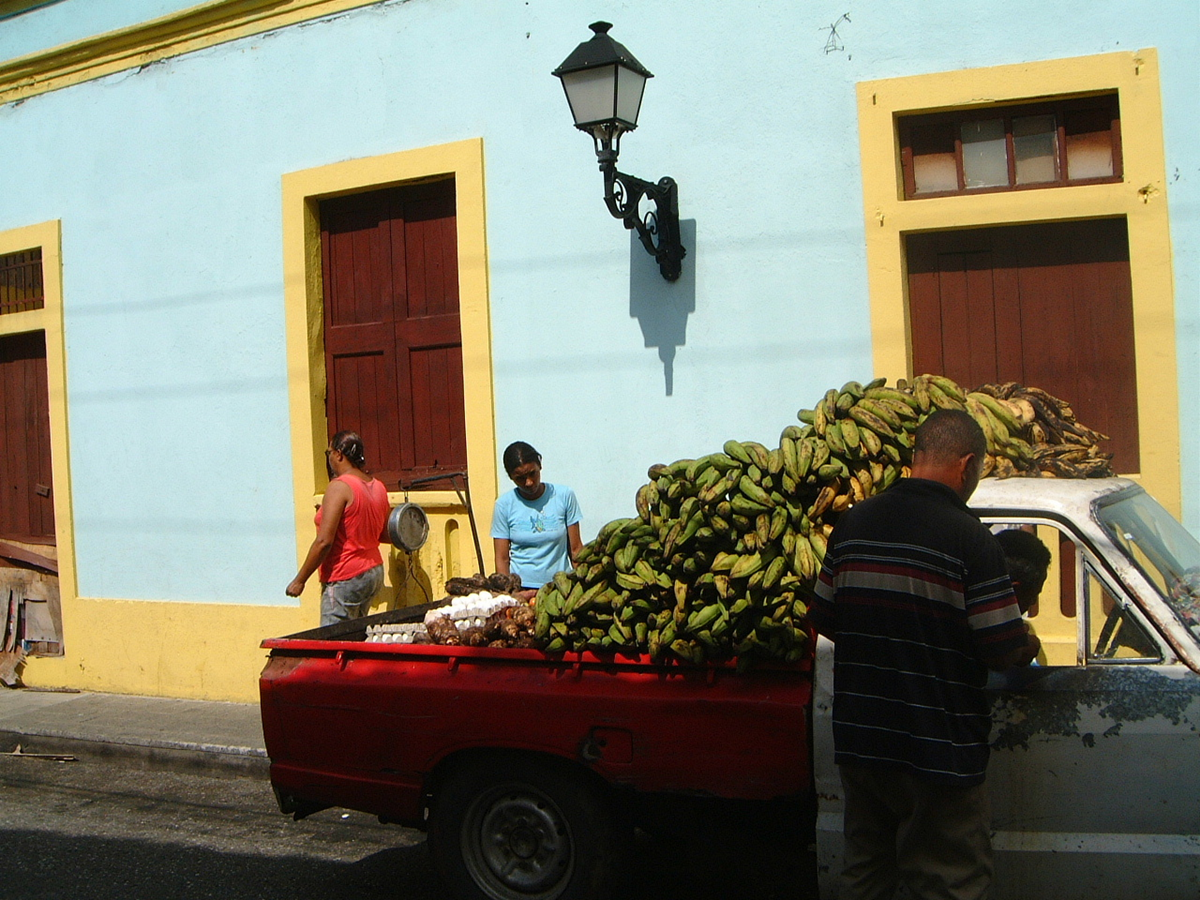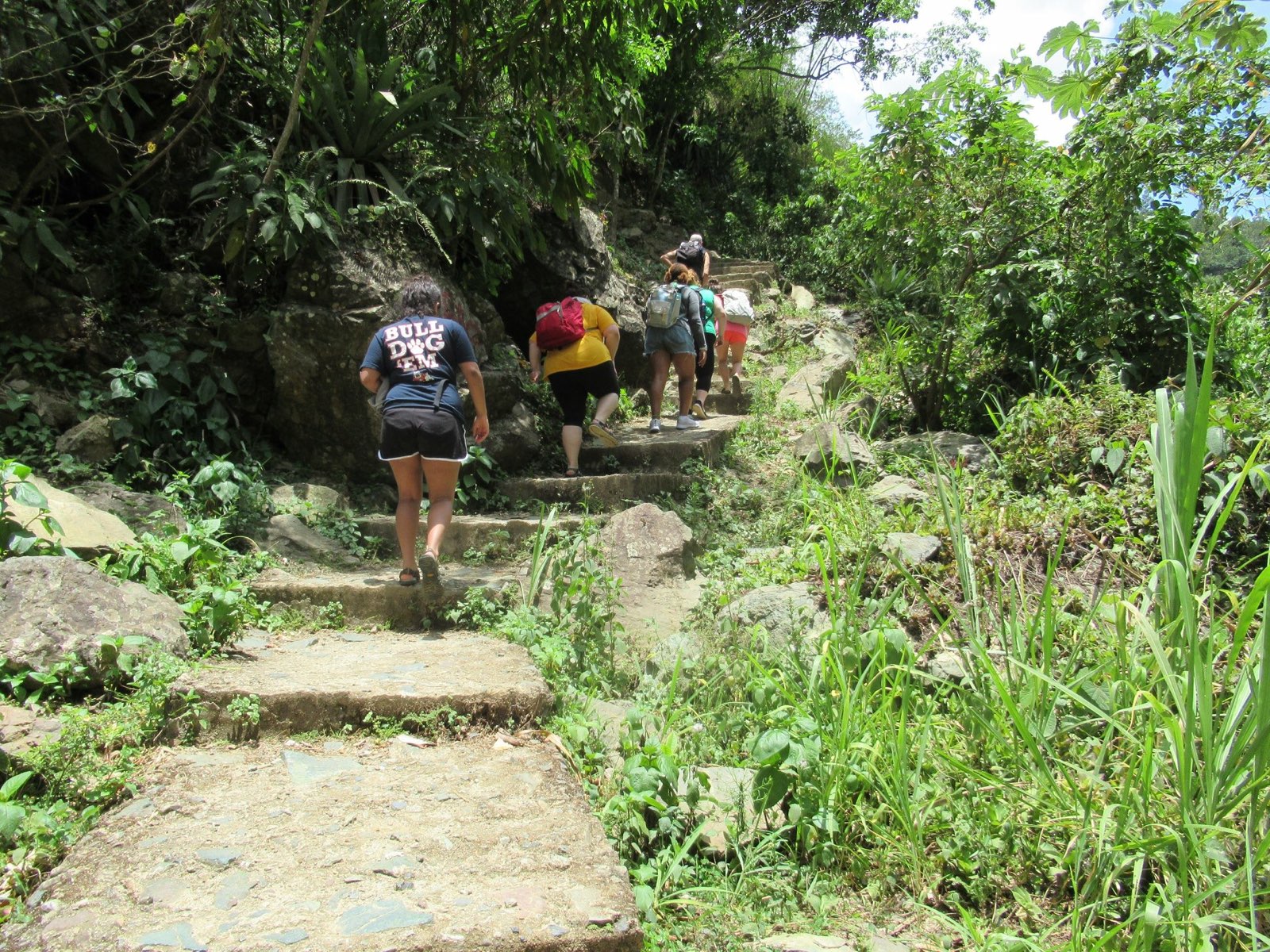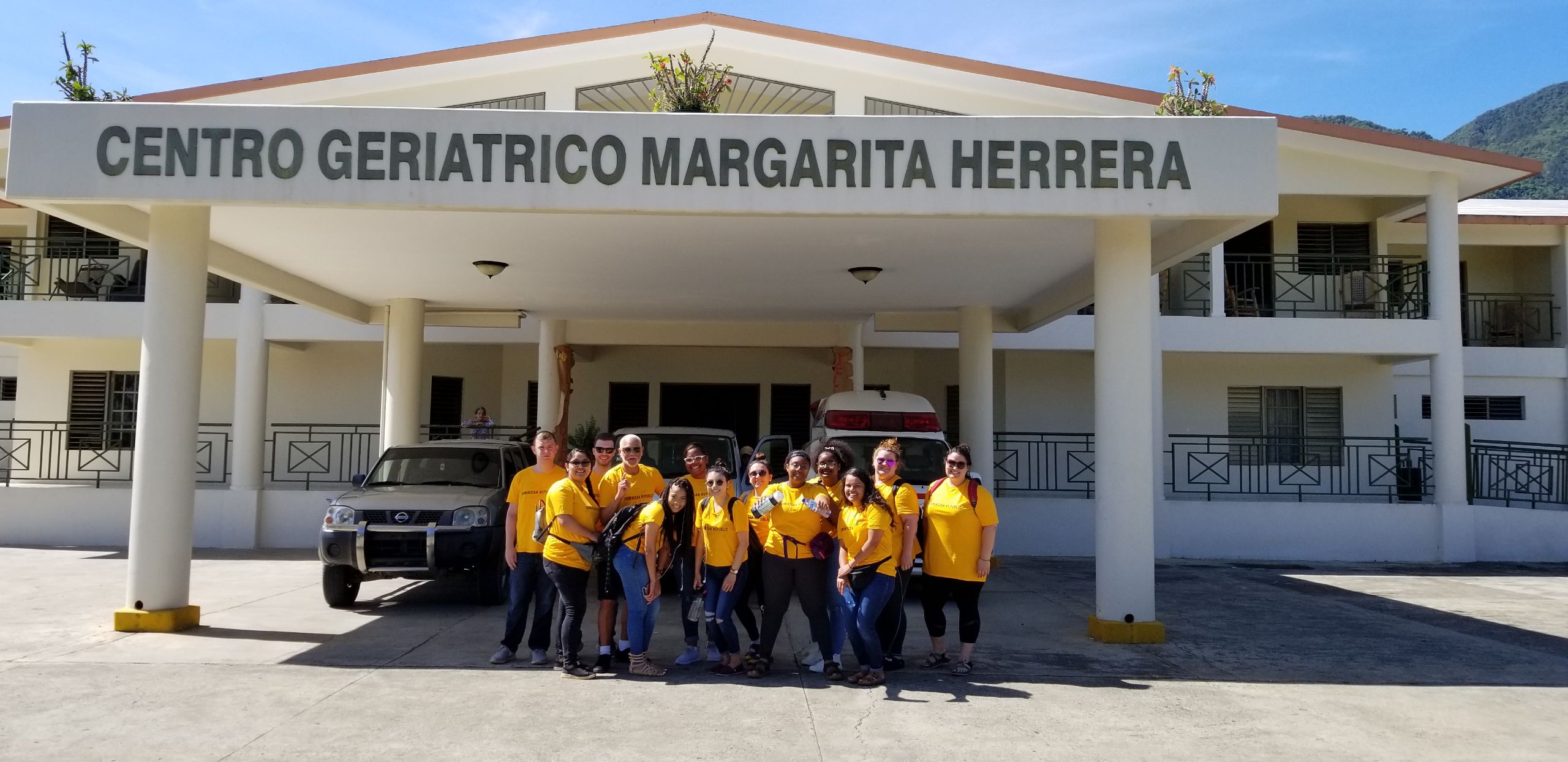Return to the search form Return to your search results
Women's Empowerment in the Dominican Republic
Fast Facts
Sessions Offered:
Winter
Location:
Santo Domingo, Dominican Republic
Credit:
Resident
Eligibility:
• Clear interest and commitment
• Demonstrated preparedness/maturity
• Good academic and disciplinary standing
• Minimum 2.5 GPA (flexible depending on specific circumstances)
• Completion of at least one semester of college-level study at the time the program begins
• Faculty approval
• Participation in orientation programming
• No Language Experience Required
Application Due:
• 9/24
Program Cost:
Check the 'Costs' section under the Application tab.
Academic Program
This three credit elective course is designed to prepare students to understand and address the complex issues associated with womxn’s empowerment, dealing with cross-culture issues, and working with marginalized and at-risk young women. Students will engage with non-profit organizations, visit local government offices, and explore the geographic and sociocultural context. Students will experience and be exposed to the most respected organizations serving Women throughout the Dominican Republic.

Syllabus
Faculty Director
This course is led by Professor Motier Haskins in the University of Iowa's School of Social Work.
Transcripts and Grading
Credit is granted through a University of Iowa transcript, and the course is graded using U.S. letter grades.
This course provides 3 semester hours of resident credit.
Program Dates
The dates for the 2025 - 2026 program are December 30 - January 17. The course will be held virtually from December 30 - January 3, and in-person in the Dominican Republic from January 4 - January 17.
For More Information
For more details about this program please contact Faculty Director Prof. Motier Haskins or Program Coordinator Cory Petersen.

Where You Will Study
Entrena, our host in the Dominican Republic, is a renowned social entrepreneurship firm based on the DR specializing in social development, sustainability, education and training since 1982. With a portfolio of high profile clients from governments, private sector, NGOs and international organizations, Entrena has implemented projects in eight countries in the Latin America and Caribbean region.
More information about Entrena can be found on their website.
Santo Domingo

Santo Domingo is the capital city of the Dominican Republic. Founded by Christopher Columbus's brother Bartolome Columbus in 1496, it is the oldest continuously inhabited European settlement in the Americas and was the first seat of the Spanish colonial empire in the New World. For this reason, the city of Santo Domingo has a rich historic and cultural heritage that makes any visit extremely worthwhile. The city is one of the most populous cities in the Central America-Caribbean area, and the main economic and commercial center of this region.
Dominican Republic

Beyond the capital, much of the DR is rural: driving through the fertile interior, you’ll see cows and horses grazing alongside the roads, and trucks loaded down with fresh produce. Further inland you’ll encounter dramatic views of hills and mountains, rivers carving their way through lush jungle and stunning waterfalls, and remote deserts, giving the DR a unique physical and cultural complexity.

US Department of State Country Information
The US Department of State provides safety and security information for every country of the world to help you assess for yourself the risks of travel. Each country information page contains a Travel Advisory, Alerts, and other important details specific to that country that could affect you.
Pay close attention to the entry and exit requirements, local laws and customs, health conditions, and other details to help decide whether traveling to any given country is right for you. Non-US citizen travelers may also wish to seek guidance from the embassy of their country of citizenship. The UI International Travel Policy for Students addresses restrictions on student travel to high-risk locations and engagement in high-risk activities abroad.
Living Arrangements
Students will stay together as a group with the Faculty Director in double or triple occupancy hotels. All program-related costs related to housing and transportation in the Dominican Republic are included in the cost of the program. While some meals may be covered in the course fee, students should plan to pay for most meals on their own out of pocket.
Passport

If you do not have a passport, apply for one as soon as possible to ensure you receive it before the program begins.
The UI Passport Office processes new U.S. passport applications and child/minor renewal applications.
US citizens can find more information about how to renew a passport on the US Department of State’s website. Most adult renewals must be done by mail.
Important notice:
Students with a valid passport should check the expiration date. Passports must be valid for at least 6 months AFTER the anticipated return to the US from studying abroad. If yours is not, you must renew your passport.
Expedited processing service is available for US passports (although this still takes several weeks and is at an additional cost). UI Study Abroad encourages students to ask the passport agency at the time of application whether expedited service is recommended.
Non-US Citizens
Students who are not US citizens should contact their consulate for more information if they need to get a new passport or renew their passport.
Travel Arrangements
Students will receive instructions for booking flights after the Confirmation Deadline. A group flight itinerary will be shared with the group and students will make their own arrangements. Do not purchase your plane tickets until you receive instructions from UI Study Abroad. Plan to purchase your plane tickets by mid-November.
Local Transportation
Transportation for all course activities is provided, including a group airport pickup and drop-off at the beginning and end of the course.
Eligibility
This course has a limited capacity. To ensure the highest level of academic preparedness, the instructor will review all applications for final decisions on admission, using the following criteria:
- Good academic and disciplinary standing: Students must be in good academic and disciplinary standing at the University of Iowa, or at another US college or university where the applicant is enrolled in a degree program. Students placed on either academic or disciplinary probation for any period of time overlapping with the study abroad program dates are ineligible to study abroad on a University of Iowa program. Academic and disciplinary history will also be considered when determining whether a student is prepared to represent the University of Iowa as part of this program. Students who are not in good standing at any point overlapping with the program dates will have their acceptance revoked, and will be responsible for the associated late withdrawal fees.
- Minimum 2.5 cumulative GPA: Students must have a minimum 2.5 cumulative GPA to participate in this program. Applications from students who have a GPA below 2.5 may be considered for the program, but will be interviewed by the faculty director in order to make a final acceptance decision.
- Completion of at least one semester of college-level study: First-year student applicants may be required to provide an academic reference in addition to other application materials. Preference given to juniors and seniors.
- Approval By faculty director and UI Study Abroad: Applications will be reviewed by the program’s faculty director, and students will be accepted based on their eligibility, and application materials.
- Attendance at mandatory orientation programming: Students must attend all in-person and online pre-departure orientation programming.
-
No language experience required: This course is taught in English. No previous language experience is required.
- Clear interest and commitment: This program is open to students of all academic backgrounds. Students must demonstrate a clear academic or personal interest in the program’s subject matter and a commitment to engage responsibly in coursework abroad.
- Demonstrated preparedness and maturity- Students must demonstrate preparedness to take on the heightened responsibilities associated with international study and travel. Students must demonstrate a commitment to behave responsibly abroad while respecting cultural differences. Students are expected to obey both local laws and program directives conveyed to participants before and during the program. The University of Iowa Code of Student Life applies to all program participants while abroad.
Waitlist Procedure:
Once the course has filled, UI Study Abroad will maintain a waitlist, and notify any students who are waitlisted. Further information will be sent out at that time to waitlisted students regarding next steps.
Participants who are enrolled at institutions other than the University of Iowa
Students who attend institutions other than the University of Iowa must also contact their home school study abroad office to review any additional study abroad requirements.

Costs
Students will be responsible for paying many of their program costs through their University of Iowa U-Bill, while other costs will be out-of-pocket costs paid by the student directly to vendors before and after going abroad. Refer to the cost sheets below for details on the costs associated with this program.
The cost sheets outline the total estimated costs associated with participating in this program and can be used for financial aid purposes. They include fees charged on students’ U-Bill as well as out-of-pocket expenses. Actual out-of-pocket expenses will vary from individual to individual. Quoted estimates are conservatively high, yet realistic.
Costs for future sessions are usually similar to the current session, however students can expect a modest increase in overall costs each session. Final cost sheets for future sessions are typically available early in the semester before the session begins.
Cost Sheet
 Cost Sheet- Women's Empowerment in the DR- 2025 - 2026
Cost Sheet- Women's Empowerment in the DR- 2025 - 2026
Included in the billed program cost:
- Application fee ($50)
- Academic instruction and guided tours in the Dominican Republic
- 3 semester hours of UI credit
- Accommodation
- Ground transport from and to the airport airport in the Dominican Republic
- Transportation for all course activities
- Welcome and Farewell dinners
- Some meals may be included- contact your UI Study Abroad advisor for details
- 24/7 staff support
- CISI International Travel insurance
Calculating Fees
The cost sheets are based on the fees described below:
- University of Iowa Study Abroad Administrative Fees
- University of Iowa’s CISI health insurance
- Program course fees, housing, flight, and other costs of attendance
Costs charged to the U-Bill
- Application fee (charged at the time of application, before financial aid/scholarships disburse)
- Course Fees (Includes tuition, housing, program-related transportation, and excursions (charged shortly before departure)
- Study Abroad Fees (charged shortly before departure)
- CISI Health Insurance (charged shortly before departure)
Out-of-pocket costs (not charged to U-Bill)
- Round trip airfare from Cedar Rapids (paid by student directly to travel agent or airline- approx. 6-8 weeks prior to departure, before financial aid/scholarships are disbursed)
- Most meals (paid by student as needed while abroad)
- Passport (paid by student prior to departure, before financial aid/scholarships are disbursed)
- Medical exam/immunizations (paid by student as needed prior to departure, before financial aid/scholarships disburse)
- Personal expenses (paid by student at their discretion while abroad)
Scholarships and Financial Aid
Students are encouraged to apply for the Need-based, Merit, and Leona Zaharis scholarships awarded by UI Study Abroad, along with any other scholarship they are eligible for. More information is available on the Scholarships for Study Abroad page.
Students who receive a Federal Pell Grant are eligible to apply for the Benjamin A Gilman International Scholarship, an external scholarship awarded by the Department of State. Learn more on the Gilman scholarship website .
Financial aid received to attend the University of Iowa (scholarships, grants, and loans) may be applied toward the program cost. Students are encouraged to contact the Office of Student Financial Aid to explore financial aid options.
Application Deadlines- The application deadlines for some scholarships are before the program's application deadline. Students can apply for scholarships even if they have not yet submitted their application to the program. See below for the application deadlines for the most common scholarships for the winter session. Be sure to check the deadline for any scholarship you are applying for and apply as soon as you can!
- Merit-Based Scholarships
- Need-Based Scholarships
- Leona Zaharis Scholarship
- Student Impact Grant
- Benjamin A. Gilman International Scholarship and A Morse-Gilman Application Scholarship
How to Apply
Students Attending the University of Iowa
- Meet with your academic advisor(s) to discuss how this program might fit your graduation plans, and to ensure that it meets your academic and personal goals.
- If you and your academic advisor agree that this program is a good match for you, complete the UI Study Abroad application. Please note that the non-refundable $50 application fee will be charged to your U-Bill as part of this online application.
- Submit the online application before the application deadline.
- The faculty director and UI Study Abroad will review your application materials and you will be contacted with your acceptance status shortly after the application deadline.
Students Attending Other Universities
- Contact the study abroad office at your home institution and ensure you follow all of the policies and procedures required for you to participate in this program.
- Contact UI study abroad advisor Cory Petersen by email at cory-petersen@uiowa.edu to request an application for the program.
- Complete the UI Study Abroad application. Please note that the non-refundable $50 application fee will be charged to your University of Iowa U-Bill as part of this online application.
- Submit the online application before the application deadline.
- The faculty director and UI Study Abroad will review your application materials and, if you meet the requirements for the program, you will be contacted with your acceptance status within 2 -3 weeks./li>
Application Deadline
Applications for the Winter session are due in late September. The final deadline for the winter 2025 - 2026 session is September 24.
Health & Safety Planning
Students should carefully review the following materials starting at least two months prior to departure:Iowa Regents CISI Health Insurance Information
Students are also encouraged to complete the Health Preparation Guide for International Travel form with their medical practitioner. This document is intended to help you plan for your medical needs abroad. Please do not submit form to UI Study Abroad.
Flights
Students will receive instructions for booking flights after the Confirmation Deadline, no later than mid-November. A group flight itinerary will be shared with the group and students will make their own arrangements. See the Logistics tab for more information.
Immigration/Visa
All program participants are required to complete immigration requirements to enter and study in your host country. UI Study Abroad and your program provider/host institution abroad will provide you with immigration instructions prior to departure.
Note that permission to enter and study in your host country is provided exclusively by the host country’s government based on that country's immigration requirements. Your host country’s immigration requirements may include considerations related to specific national origin, national heritage, criminal background status, and similar issues that can make it impossible to receive permission to enter the country in some cases. Contact your UI study abroad advisor for more information.
It is essential that you thoroughly review all of your immigration materials before you leave for your host country to ensure that they are absolutely complete and accurate. It is entirely your responsibility to ensure that all of your immigration materials are in order and fully accurate before you leave for your host country. If any of your immigration materials contain inaccurate information of any kind, contact your UI study abroad advisor immediately to discuss your options.
Do not take steps to complete your host country’s immigration requirements until you receive more information from UI Study Abroad.
Review the information under the Visas heading our Prepare for Departure page for further guidance on the immigration/visa process.
Orientation
In order to prepare for your time abroad, you are required by the University of Iowa to complete two orientations. These may be in addition to orientations provided by your on-site provider. See below for more information.
Online Education Abroad Pre-Departure Orientation
You are required to complete the International Programs ICON course "Education Abroad Pre-Departure Orientation" prior to departure. This orientation is mandatory for all students going abroad under the auspices of the University of Iowa. It covers many practical matters about living overseas, such as health and safety, communication, money, goals, and much more. You will be enrolled in this course by International Programs and an email will be sent to you once enrolled. If you have any questions, you can email safety-abroad@uiowa.edu.
Program-Specific Orientation
A mandatory, in-person orientation will be facilitated by the Faculty Leader and Study Abroad Coordinator before departure and will cover content specific to your program and host country.
